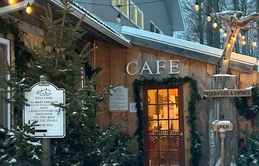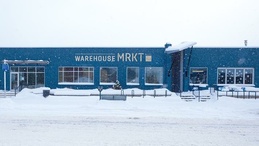
Bahle's: The Store that Built Suttons Bay
145 Years Strong
By Ross Boissoneau | Dec. 18, 2021
*With its antique displays, wood floors, classic clothing lines and various reminders of days past, Bahle’s of Suttons Bay feels like it’s been there forever.
Just about. As Bahle’s nears its sesquicentennial, it’s interesting to observe how its rise, fall, and subsequent rise parallels the development of the town itself.
When Lars “LE” Bahle opened the store in 1876, he was just six years removed from departing his native Norway for America. Reflecting the nature of the town, Bahle’s was the prototypical general store that sold most everything: clothing, dry goods, hardware, and other staples of pre-20th Century life in an undeveloped wilderness. Supplies and merchandise often arrived via the railroad; the tracks ran behind the store, bordering the storage barn that is still in use today. As the tiny village and its burgeoning farm community grew, so too did LE’s business — so much so that the merchant had a schooner built to supply the store. As the go-to spot for just about everything in town, Bahle’s served as the town post office, too.
LE’s eldest son, Otto, bought him out in 1920, when Otto was 28 years old. Otto’s son Owen was born the next year, and as he grew up, followed his father into the family business. By the time the fourth generation came of age, Suttons Bay had fallen on lean times. The region’s agricultural fortunes were dwindling, and Suttons Bay hadn’t yet become a successful resort town like nearby Leland and Northport.
Still, that fourth generation — Owen and Leila’s children, Lois, Robert, Richard, Karl, and Chris — enjoyed their home, with Lake Michigan out front and the woods out back. “Growing up, [it] was idyllic, like going to camp,” says Karl. But the town wasn’t particularly prosperous or even attractive. “Suttons Bay wasn’t interesting. It was a cherry-processing town, and it was worn out.”
As they grew older, the Bahle kids weren’t interested in sticking around. Not at first, anyway. But eventually, they all returned to their hometown and became part of the family operations.
Rich didn’t even bother to finish his engineering studies at the University of Michigan. “I realized how much I missed here, the place, the farm, the business, more than I wanted to finish my degree,” he says. He returned to the family farm, and says he loved the farming life. However, economic forces eventually signified the end of that career. “I loved the life, [but] shut it down. It was a hard hit, but it had to happen.”
At that point he moved into real estate, including selling property that became Tendercare skilled nursing facility, now Medilodge. Rich says Dad wasn’t thrilled about the property’s use for senior living; he felt the last thing the town needed was more old people. But Rich recognized that healthcare would become ever more necessary as the region’s amenities became more attractive to retirees.
Lois, Karl, and Chris became part of the store’s operation: Lois as buyer, Karl out front, and Chris handling the accounting and financial aspects. As the years progressed, the three worked to ensure the store changed with the times — initially not so much in terms of style but in terms of practicality. Lois says changes in farming technology impacted the store’s inventory significantly: As mechanical harvesting replaced migrant workers, there was less call for work clothes, and the store began carrying more resort wear as Suttons Bay became a vacation and second-home destination. “We changed the inventory to better quality [due to] the tourist industry,” she said.
The Bay Theatre became Robert’s baby — though he hadn’t set out to run it, and wasn’t even in Suttons Bay to adopt it. “To my surprise, [Mom and Dad] called and said, ‘We bought the theater. It’s your opportunity to come home.’ [My dad] always said there’s a lot of opportunity here. Mom and Dad made those opportunities.
“When I was running the theater, I thought if I’m doing this in five years, it will be a miracle. Then at 15 [years in], it became my career. After 30 years, I stepped down.” After Robert’s retirement, Rich’s son Erik (that’s the fifth generation, for those counting at home) took over. Today it is run as a community nonprofit. Erik subsequently moved on to managing another venture, Bahle Farms Golf Course, which was sold earlier this year. Today he is involved in the property management side of the family’s business.
While things have changed and continue to do so, the store remains part of the fabric of Suttons Bay. It offers a variety of men’s and women’s clothing, from outerwear to T-shirts, jeans to hats to sweaters to accessories and everything in between. Upon Lois Bahle’s retirement six years ago, Stacy Sheren, a retail and visual merchandise pro who has owned and run her own boutiques, came in as buyer and also serves as manager today. She’s responsible for the design of the store’s makeover a few years ago. It was reimagined as the kind of place it might have been several decades previous, and she enjoys it when people tell her the store looks just like it used to — even though it actually doesn’t.
“What I’ve tried to do is marry retail and museum,” says Sheren. As the former, it carries premium labels like Barbour, Dubarry of Ireland, Patagonia, and other upscale brands many might not expect to find in a small town in northern Michigan. “They’re more luxury goods. It’s wants; not needs.”
The historical aspect is served by any number of signs, displays, and artifacts. Part of the original post office fixtures are on display in the back of the store. Orchard ladders are used as displays. Receipts from yesteryear are showcased as well. “People enjoy the history,” says Sheren.
While Sheren manages the store, the Bahles remain in the picture, though mostly in the background. “No family members … are actively involved in the retail [operation] day to day,” says Karl.
What does the future hold? Change for sure, but other than that no one can say for sure. As shopping migrates toward online options, they say the presentation and customer service will become even more important. “The focus is on customer service, creating an experience for the consumers. There’s so much competition with the internet, but people miss the entertainment factor of shopping,” says Sheren.
“Retail demands more of a theater aspect,” agrees Karl.
No doubt there’s plenty of that, from the displays the public sees to mannequins and button books in the attic, even the old printing press in the basement where the family used to print its own signs and flyers. Part museum, part high-end fashion, and all experiential, Bahle’s seems primed to blast past its sesquicentennial and far beyond.
*Pictured above: The earliest known image of Bahle’s mercantile store, taken around 1885. Photo courtesy of Karl Bahle.
Trending

Welcoming the Winter Solstice: Rituals & Events for the Shortest Day of the Year
With the winter solstice quickly approaching, it’s hard not to notice how dark each day feels. Astronomically, this is… Read More >>
Camp Greilick Now Open!
It’s been a long road for the century-old Camp Greilick, which, after several dormant years, was acquired by Grand Tra… Read More >>
Men and Ugly Sweaters
Those two things don’t always go together, but on Dec. 19, you’ll see both out and about in Petoskey and Harbor … Read More >>


